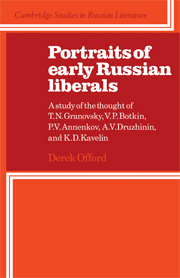 Portraits of Early Russian Liberals
Portraits of Early Russian Liberals Published online by Cambridge University Press: 06 July 2010
Granovsky's status in the intelligentsia and the reasons for his neglect
In October 1855 Turgenev addressed to the editors of the journal Sovremennik an obituary notice, which was headed by an epigraph from Schiller, ‘Auch die Todten sollen lebert (‘the dead must also live’), and began with an account of a funeral Turgenev had attended the day before:
Yesterday Granovsky's funeral took place. I am not going to describe to you how much his death affected me. His loss may be reckoned society's loss and will be received with bitter perplexity and grief in many hearts throughout Russia. His funeral was a moving and deeply significant occasion; it will remain an important event in the memory of everyone who took part in it. I shall never forget the long procession, the coffin gently rocking on the shoulders of the students, the bare heads and young faces ennobled by an expression of honest and sincere sorrow, nor how many people in spite of themselves tarried among the scattered graves of the cemetery even when everything was over and after the last handful of earth had fallen on the remains of the beloved teacher …
The occasion was not the pretext for an overtly political demonstration, as the funerals of prominent figures in the Russian intelligentsia were later to become.
To save this book to your Kindle, first ensure [email protected] is added to your Approved Personal Document E-mail List under your Personal Document Settings on the Manage Your Content and Devices page of your Amazon account. Then enter the ‘name’ part of your Kindle email address below. Find out more about saving to your Kindle.
Note you can select to save to either the @free.kindle.com or @kindle.com variations. ‘@free.kindle.com’ emails are free but can only be saved to your device when it is connected to wi-fi. ‘@kindle.com’ emails can be delivered even when you are not connected to wi-fi, but note that service fees apply.
Find out more about the Kindle Personal Document Service.
To save content items to your account, please confirm that you agree to abide by our usage policies. If this is the first time you use this feature, you will be asked to authorise Cambridge Core to connect with your account. Find out more about saving content to Dropbox.
To save content items to your account, please confirm that you agree to abide by our usage policies. If this is the first time you use this feature, you will be asked to authorise Cambridge Core to connect with your account. Find out more about saving content to Google Drive.